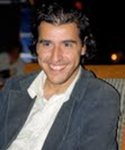Psychology, Religion, and Consciousness
Now Accepting Applications for Fall 2025
The fully online PRC program critically considers the psychology of religious experience across a wide range of disciplines and examines the nature of religious consciousness as it arises both individually and collectively.
Request More InformationM.A./Ph.D. in Psychology, Religion, and Consciousness Online Program
M.A./Ph.D. in Psychology, Religion, and Consciousness
State Authorization: Click to View States Pacifica is Authorized to Enroll By Program.
“It is that our normal waking consciousness, rational consciousness as we call it, is but one special type of consciousness, whilst all about it, parted from it by the filmiest of screens, there lie potential forms of consciousness entirely different…. How to regard them is the question.”
~ William James, The Varieties of Religious Experience
The study of human consciousness traverses a wide range of phenomena, including advances in the psychology of the unconscious, religious and spiritual experience, near-death experience and altered states of consciousness, the mind-matter problem, as well as the broad spectrum and phenomenology of consciousness itself. Pacifica Graduate Institute’s online MA/PhD program in Psychology, Religion, and Consciousness rigorously and creatively engages with such diverse and wide-ranging phenomena, and dialogically synthesizes these vital areas of academic inquiry into a unique inter-disciplinary graduate-level education.The emergence over the past fifty-plus years of a reinvigorated, pluralistic, and spiritually diverse culture has demonstrated increasing numbers of people eschewing traditional religious belief and practice in favor of experimental, individualistic, and highly syncretized spiritual paths. In response to the prevailing secularism of modern society and the decline of traditional religions, such people find themselves embarking on a quest for deeper life meaning, self-knowledge, and direct religious experience, often within the context of alternative or emerging communities. One need only consider the plethora of practices and perspectives now available—depth psychology, transpersonal psychology, integral theory, yoga, shamanism, psychedelics, mindfulness, esotericism, mysticism, global mythologies and nonwestern religions, creative arts, Indigenous practices, new-paradigm sciences, ecological consciousness, and more.
Contact the Admissions Advisor
- Michael Mirabella, Admissions Advisor
- Phone (call or text): 805-881-1311
- Email Address: mmirabella@pacifica.edu
PROGRAM LEARNING OBJECTIVES:
- Demonstrate ability to articulate and apply key concepts and approaches derived from relevant perspectives in psychology, religion, and consciousness studies.
- Critically analyze theoretical approaches in the study of psychology, religion, and consciousness.
- Conduct research that makes an original scholarly contribution.
- Demonstrate introspective capacities and a depth psychological or religious sensibility in the exploration and understanding of both personal and collective experience.
- Evaluate the study of psychology, religion, and consciousness in relation to other disciplines and to historical and cultural contexts.
- Demonstrate the capacity for structured thought, and the clear articulation and persuasive communication of theories and perspectives in the psychology of religion and consciousness studies.
- Analyze the significance and practice of psychology, religion, and consciousness studies to 21st century conditions, including globalization, ethical concerns, diversity, and multiple ways of knowing.
STUDENT CAREER PATHS & GOALS:
- Postdoctoral research in the psychology of religion, comparative religion or religious studies, consciousness studies, cultural studies, depth psychology, transdisciplinary studies, and cognate areas.
- College professor / university lecturer in the above areas.
- Government and non-profit think-tanks and research bodies dealing with complex problems and future trends, such as commentary on social patterns and practices.
- Psychotherapists and healers with a special interest in spirituality.
- Guides, coaches, and mentors in the areas of transpersonal psychology and spirituality.
- Workshop leaders and authors of popular books, articles, and blogs on spiritual matters.
Featured Blog Posts and Multi-Media
Scholarships
Education Assistance The Education Assistance Scholarship is sponsored by Pacifica Graduate Institute and offered to new and returning students based on extreme financial hardship and strong academic excellence. Awards are made annually at the beginning of each academic year. The award is $1,000 to be equally divided over the academic year. This scholarship is not renewable, and students must apply each academic year. Students enrolled in the PhD and PsyD Dissertation phase of their programs are not eligible for scholarship consideration.
Yellow Ribbon Matching Scholarship Pacifica Graduate Institute is pleased to announce that we have entered into an agreement with the Veteran’s Administration in support of veterans continuing their education under the Post 9/11 GI Bill. Pacifica has agreed to provide up to ten Yellow Ribbon Scholarships each year for qualifying veterans under the Post 9/11 GI Bill on a first-come first-serve basis. Students in the M.A. Counseling program will qualify for up to $6,500 per year, M.A. Engaged Humanities and Creative Life will qualify for up to $5,400 per year, and those in the doctoral programs will qualify for up to $7,800 per year.
Request Information
Learn MoreChair & Faculty
The faculty members of Pacifica’s M.A./Ph.D. in Psychology, Religion, and Consciousness bring a passion for education and a wealth of real-world experience into the classroom. As leaders in their fields, the members of Pacifica’s faculty include academic authors of international acclaim, renowned lecturers, skilled classroom facilitators, depth psychologists, historians, psychologists, and philosophers of religion, and committed critical thinkers. All Psychology, Religion, and Consciousness faculty members share a passion for education and are dedicated to working with adult learners. To learn more about the faculty in the M.A./Ph.D. in Psychology, Religion, and Consciousness, then read the individual descriptions below.
Curriculum Overview
The Master of Arts degree is awarded after the first two years of study and successful completion of the comprehensive examinations. Students seeking the doctorate degree engage in a third year of course work that includes a sequence of research courses and the development of a concept paper for the dissertation. The fourth and fifth years of study focus on dissertation writing and research. Continuing supervision is provided for the completion of the dissertation.
The live, online portion of PRC classes takes place twice per week during fall, winter, and spring quarters. There are no courses offered during the summer quarter.
First Year
Second Year
Third Year
*The curriculum may vary depending upon evolving academic needs. The required fourth and fifth years of study focus on reading, research, and dissertation writing.
Graduation Requirements
Degree Requirements For Graduation
- Students must complete 72 quarter units to fulfill the unit requirement for graduation.
- A minimum grade of “C” is required in each completed course. A cumulative grade point average of 3.0 must be maintained.
- Students must attend at least two-thirds of each course.
- Students must successfully pass a Comprehensive Examination during the second year of course work. Each exam essay must receive at least 80 points. The M.A. degree is awarded when the Comprehensive Exam is successfully completed along with 36 quarter units. To be eligible to continue coursework towards the Ph.D. degree, students must complete the Comprehensive Exam and 36 units of coursework.
- Students must pass an Oral Consultation pertaining to a concept paper for the dissertation.
- Students must submit and defend an original dissertation accepted by the faculty.
Comprehensive Examination
The Comprehensive Examination is a written exam taken during the second year of the program that examines students’ understanding of theoretical perspectives pertaining to the core competencies of the three PRC program areas. In addition, an oral consultation takes place in the Dissertation Development course during the third year of the program. The purpose of this assessment is to raise critical questions pertaining to the proposed dissertation project. Students must successfully incorporate the critique of this consultation into their dissertation concept papers in order to advance to candidacy.Doctoral Dissertation
The dissertation requirements include successful completion of the advanced research courses offered in the third year of the program. Students must produce an acceptable Dissertation Concept Paper before enrolling in Dissertation Writing. The Dissertation Committee is composed of a Chair, a Reader, and an External Reader. Each member must possess an earned doctorate degree based on a dissertation, unless this requirement is waived by the Research Coordinator of the PRC Program.Enroll Today
Apply NowAll of Pacifica Graduate lnstitute’s degree programs are accredited by the Western Association of School and Colleges (WASC) and federal financial aid is available for those who qualify.












